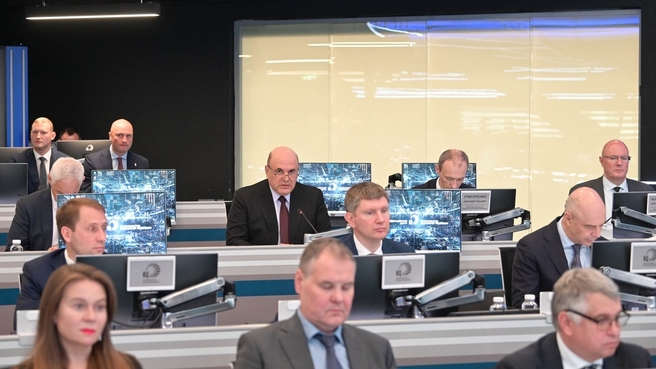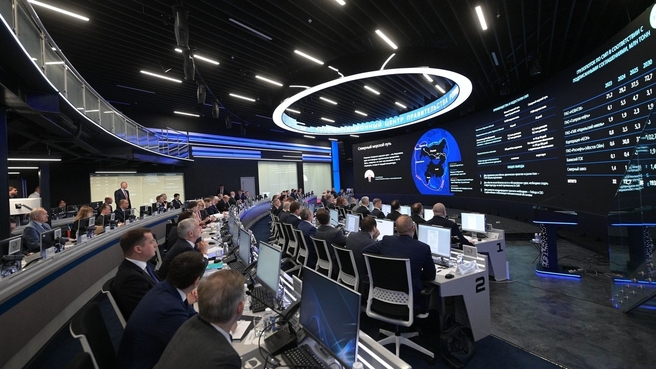Mikhail Mishustin’s opening remarks:
Good afternoon, colleagues,
Today we will review the progress of the Northern Sea Route development plan. The plan was developed at the President’s instruction and approved last August. The plan includes construction of more than 50 icebreakers and ice-class vessels, ports and terminals, emergency and rescue centres, as well as building an orbital group of satellites. The total investment in its implementation over the next 13 years will amount to 2 trillion roubles, with only a third of that, or 600 billion, allocated from the federal budget.
Essentially, we are building a new Arctic economy. Several projects have already been realised, including a modern management system that boosted the effectiveness and security of sea navigation. The system comprises a radar ice conditions satellite that was launched from the Vostochny Space Launch Centre last week; three nuclear-powered icebreakers, including the world’s most powerful Arktika icebreaker. The Utrenny terminal in the Gulf of Ob is expected to accommodate a floating LNG production facility. The Sevmorput nuclear-powered cargo ship makes regular coastal voyages from northwestern Russia to the Russian Far East and back.
It is very important to create an integrated infrastructure complex that will comprise new ports, maintenance and emergency stations, a weather and ice monitoring system and traffic management along the entire Northern Sea Route. This includes launching five weather satellites into orbit this year, ahead of schedule. The satellites will ensure continuous observation and assistance on all Arctic routes.
The Northern Sea Route is a key element in improving transport connectivity in the most hard-to-access territories of our country. The Government has developed a bill on northern supplies that has already been through its first reading by the State Duma.
This bill not only concerns delivering critically important cargo to remote areas for people and organisations – although these types of items account for one-third of the total amount of marine cargo. Dynamic and reliable supplies of construction materials and equipment are necessary for large-scale projects like Arctic LNG as they drive the development of related industries and the Arctic and Far Eastern regions in general.
The possibility of freely redirecting cargo to any route, to the east or the west while remaining in Russian territorial waters and exclusive economic zone, is a critical factor for businesses as it substantially increases the marketability of Russian companies in global markets.
Further expansion of the infrastructure in the Far North will allow shipping for which the capacities of the Eastern Operating Domain are not sufficient. Our job is to ensure there is a cost-efficient cargo base with room to grow.
For this purpose, six agreements were signed with key investors, including Vostok Oil, Novatek, Gazprom Neft, Norilsk Nickel, Northern Star and Baimskaya. These leading Arctic companies intend to increase the volume of shipping to over 190 million tonnes in the next few years.
These projects will generate additional budget revenue of more than 20 trillion roubles, meaning that each invested rouble will return around 30 roubles to the budget.
As the President stressed, our foreign partners want to strengthen relations with Russia and have shown interest in operating on the Northern Sea Route. It is the shortest water route for delivering goods from Southeast Asia and China to European ports. Indian companies are also considering these kinds of projects.
Favourable conditions are forming for developing tourism in the Arctic zone. We have talked about this many times in previous meetings. The Far North receives over 1.5 million Russian and foreign tourists per year. This should be taken into account. The hospitality industry is one of the highest multipliers for the economy and creates many jobs.
Colleagues,
It is important that we prepare further steps to boost the country’s essential sea route that the President described as an obvious strategic priority. First of all, it is necessary to develop measures to redirect the cargo shipping base from the West to the East, to build ice-class and other vessels and provide enough icebreakers, and develop seaports beyond the Northern Sea Route.
The wellbeing of residents in the Russian Arctic and the Far East depends on this, as does general growth in the Russian economy.










